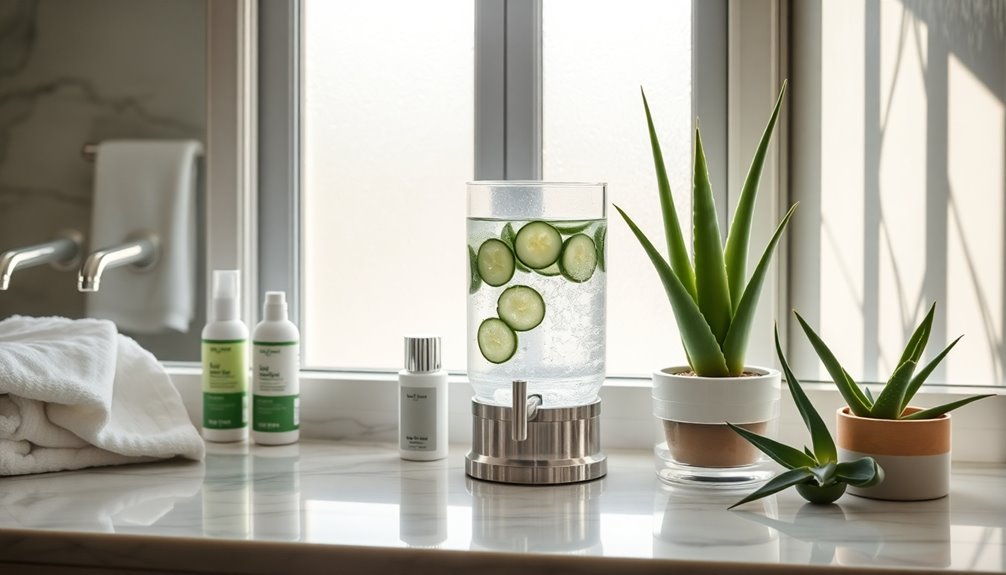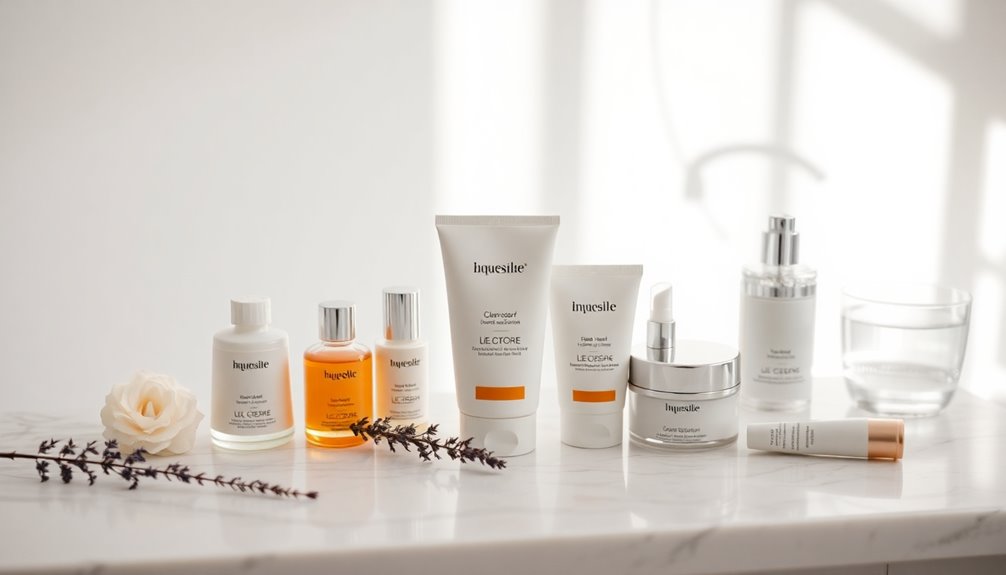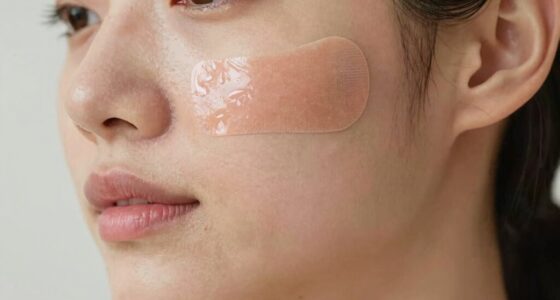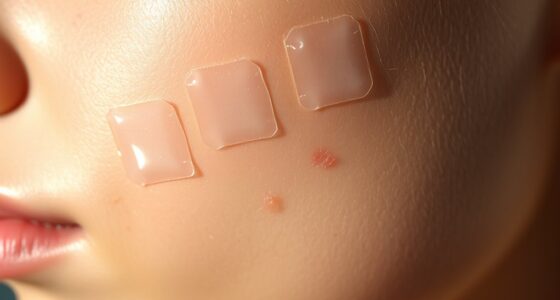To build a skincare routine for sensitive skin, start with gentle, soap-free cleansers and opt for fragrance-free moisturizers containing soothing ingredients like niacinamide and ceramides. Pay attention to your skin triggers by keeping a diary and patch-test new products before use. Always hydrate your skin and apply a broad-spectrum sunscreen daily to protect against irritants. If you adjust your routine based on your skin's reactions, you'll find the right balance for your unique needs. You'll discover more tips to enhance your regimen.
Key Takeaways
- Start with a gentle, soap-free cleanser to remove impurities without stripping essential oils from sensitive skin.
- Follow with a fragrance-free, hypoallergenic moisturizer to lock in hydration and strengthen the skin barrier.
- Incorporate soothing ingredients like niacinamide and ceramides to enhance hydration and reduce irritation.
- Apply a broad-spectrum mineral sunscreen with SPF 30 or higher daily to protect against UV damage.
- Keep a skincare diary to track reactions and identify any personal triggers or irritants in products.
Understanding Sensitive Skin

Sensitive skin can feel like a constant battle, affecting many people in their daily lives.
You're not alone; around 60% of women and 50% of men experience some level of sensitivity. This condition often means your skin barrier is weaker, making it easier for irritants to penetrate and disrupt your moisture barrier. Additionally, essential oils can be highly potent, so proper dilution is important when incorporating them into your routine to prevent irritation.
Symptoms like redness, itching, and burning can arise from various triggers. Conditions like eczema and rosacea may also make your skin more reactive.
To effectively manage sensitive skin, it's vital to consult a dermatologist who can provide tailored advice. Choosing the right skincare products is essential to calm your skin and avoid exacerbating symptoms. Focus on gentle, hydrating formulations that support your skin barrier to minimize irritation. Additionally, incorporating ingredients like glycolic acid can provide gentle exfoliation without causing irritation.
Identifying Your Skin Triggers

To effectively manage your sensitive skin, it's essential to identify what triggers your reactions.
Keeping a diary to track your skin's responses to products and environmental factors can help you pinpoint common irritants, like fragrances and harsh chemicals. Additionally, consider incorporating glycolic acid products into your routine, as they are known for enhancing skin texture and radiance. Using natural remedies, such as essential oils for soothing irritation, can also provide relief for sensitive skin.
Common Irritants to Avoid
Identifying skin irritants is essential for managing sensitivities effectively. Common irritants like fragrances, harsh chemicals, sulfates, alcohol, and parabens can exacerbate your skin reactions. Additionally, using hydrocolloid patches can help treat localized acne without aggravating sensitive skin.
To protect your skin, opt for a fragrance-free cleanser and avoid products containing essential oils, as they often lead to irritation. Weather changes, such as extreme temperatures, can also trigger sensitivities, so keep an eye on environmental factors. Always perform a patch test with new products before applying them fully to detect any potential irritants.
Finally, remember to moisturize and protect your skin to maintain a healthy protective barrier. By avoiding these irritants, you'll be on your way to soothing your sensitive skin and reducing discomfort. Additionally, incorporating regular skin treatments can help improve overall skin resilience and reduce sensitivity.
Tracking Skin Reactions
How can you effectively pinpoint what irritates your skin? Start by tracking skin reactions in a diary. Note down your skin's responses after trying new skincare products or changing your routine. This practice helps you identify triggers—like fragrances, harsh chemicals, or environmental factors—that can lead to sensitivity. Pay attention to symptoms like redness, itching, or burning sensations; these insights reveal which irritants to avoid. Additionally, maintaining a consistent bedtime routine can help reduce stress on your skin, as stress is often a trigger for sensitivity. Engaging in mindfulness practices can also promote relaxation and decrease stress, further benefiting your skin health. Remember, awareness of personal triggers varies from person to person, so what affects you mightn't affect someone else. By understanding your skin's unique reactions, you can customize your skincare regimen to minimize irritation and enhance your skin's health. This tailored approach is key to managing sensitive skin effectively.
Choosing the Right Cleanser

Finding the right cleanser can make a significant difference for those with sensitive skin. Choose a gentle cleanser that's soap-free to effectively remove dirt without stripping your skin's natural oils. Avoid harsh ingredients like sulfates and fragrances, which can lead to irritations. Opt for hypoallergenic products specifically formulated for sensitive skin. Many brands, like Patchology, focus on quality ingredients that cater to sensitive skin needs. Additionally, using butter as a natural moisturizer can help soothe and hydrate sensitive skin.
| Recommended Cleansers | Avoid |
|---|---|
| Oil-based cleansers | Sulfate-based |
| Creamy hydrating cleansers | Alcohol-containing |
| Gentle, soap-free options | Fragrance-laden |
| Natural oils | Harsh exfoliants |
Always patch-test new cleansers to identify any adverse reactions before applying them to your entire face. This extra step helps guarantee your skincare routine remains gentle and effective.
Importance of Hydration

Keeping your skin hydrated is essential for maintaining a strong moisture barrier, especially if you have sensitive skin.
When you guarantee your skin gets enough hydration, you not only soothe irritation but also enhance its resilience against stressors.
Incorporating the right hydrating ingredients can make all the difference in your skincare routine.
Maintain Moisture Barrier
Since maintaining a healthy moisture barrier is vital for sensitive skin, you'll want to prioritize hydration in your skincare routine. A well-functioning moisture barrier protects against irritants and prevents moisture loss, helping to reduce irritation.
Incorporate hydrating products containing ingredients like hyaluronic acid and ceramides to improve skin hydration levels. These ingredients help reinforce your moisture barrier, minimizing transepidermal water loss (TEWL) that can lead to dryness and increased sensitivity.
Establish a consistent moisturizing routine to guarantee your skin stays adequately hydrated. Pay attention to environmental factors, such as low humidity and harsh weather, which can deplete your moisture barrier.
Adapting your skincare with additional hydration during these times is vital for maintaining skin health and comfort.
Soothing Ingredient Benefits
To effectively soothe sensitive skin, you should incorporate ingredients that enhance hydration and comfort. Hydration is essential for maintaining your skin barrier, reducing irritation, and preventing moisture loss.
Hyaluronic acid stands out as an excellent humectant, drawing moisture into your skin for long-lasting hydration and a plump appearance.
Colloidal oatmeal not only soothes irritation but also acts as a natural moisturizer, helping retain your skin's moisture and shielding against dryness.
Additionally, niacinamide improves hydration and strengthens your skin's barrier function, making it a fantastic choice for sensitive skin types.
Incorporating Toner and Serums

When you're ready to enhance your skincare routine, incorporating toner and serums can make a significant difference for sensitive skin.
Opt for alcohol-free toners with soothing ingredients like aloe vera or chamomile to avoid irritation while maintaining hydration. For serums, choose gentle options with hyaluronic acid or niacinamide to soothe your skin and strengthen its barrier.
- Prioritize hypoallergenic formulations to minimize risks.
- Perform a patch test before applying new products to identify any adverse reactions.
- Consider calming facial mists as a hydrating alternative to traditional toners.
Moisturizing for Sensitive Skin

Moisturizing is essential for maintaining healthy skin, especially if you have sensitive skin that's prone to irritation. Regularly moisturizing helps maintain your skin barrier, preventing moisture loss and reducing discomfort.
Look for products with soothing ingredients like niacinamide and ceramides, which restore hydration and strengthen your skin barrier. Always choose fragrance-free and hypoallergenic moisturizers to avoid potential irritants.
Apply your moisturizer immediately after cleansing while your skin is still damp; this locks in moisture effectively. For overnight hydration, consider thicker emollient creams or ointments. They create a protective layer, alleviating dryness and irritation while you sleep.
Prioritizing these moisturizing steps will help keep your sensitive skin balanced and comfortable.
Sunscreen: A Must-Have

Sunscreen is essential for anyone with sensitive skin, as it shields your complexion from harmful UV rays that can worsen irritation and redness. To protect your skin effectively, opt for a broad-spectrum SPF of at least 30, ideally using mineral sunscreens with zinc oxide or titanium dioxide. These ingredients are less likely to cause irritation compared to chemical options.
- Protects you from sunburn and skin damage
- Helps maintain an even skin tone
- Keeps irritation and redness at bay
Remember to apply sunscreen generously and reapply every two hours, especially after sweating or swimming.
Consider tinted mineral sunscreens for added benefits, as they can help even out your skin tone and provide additional protection against visible discoloration.
Patch Testing New Products

Before trying out a new product, you should always patch test to avoid unwanted reactions.
Simply apply a small amount to a discreet area of your skin and wait 24-48 hours to see how your skin reacts.
This step is essential, even for products labeled "hypoallergenic," as sensitivities can still arise.
Importance of Patch Testing
How can you guarantee your skincare products won't irritate your sensitive skin? The answer lies in patch testing. This vital step helps identify potential allergens before applying products widely.
Here's why it matters:
- Protects against unexpected adverse reactions.
- Tailors your routine to the unique needs of your skin.
- Builds confidence in the products you choose.
The American Academy of Dermatology emphasizes patch testing, especially for items with fragrances or harsh ingredients.
Remember, even "hypoallergenic" labels aren't foolproof; individual reactions vary. By regularly patch testing, you can prevent discomfort and create a skincare routine that truly supports your sensitive skin.
Your skin deserves the best, so take this essential step for peace of mind!
How to Patch Test
Patch testing is a straightforward way to confirm your new skincare products are safe for your sensitive skin.
Start by applying a small amount of the product to a discreet area, like your inner forearm. Choose a hypoallergenic or fragrance-free option to minimize irritation.
Wait 24-48 hours and monitor for any adverse reactions, such as redness, itching, or swelling. If you notice any irritation, stop using the product immediately and consult a dermatologist if needed.
Keeping a record of your patch test reactions can help you identify personal triggers and refine your future product selections.
This proactive approach confirms that you only use products that are gentle and suitable for your unique skin needs.
Adjusting Your Routine Based on Reactions

As you navigate your skincare journey, adjusting your routine based on skin reactions is essential for maintaining healthy, sensitive skin.
Start by monitoring skin reactions closely; keeping a diary can help you identify triggers and patterns. If irritation occurs, simplify your routine by focusing on cleansing and moisturizing until your skin calms down.
Consider these steps:
- Patch testing new products to prevent adverse reactions
- Adjusting the frequency of exfoliation to avoid irritation
- Switching to soothing, hypoallergenic products if you notice persistent redness
Recommended Products for Sensitive Skin

Finding the right products for sensitive skin can be a game-changer in your skincare routine. Look for recommended products for sensitive skin that are labeled "hypoallergenic" or "fragrance-free" to minimize irritation.
Choosing hypoallergenic and fragrance-free products can transform your skincare routine for sensitive skin.
Ingredients like ceramides and niacinamide are fantastic for maintaining hydration and strengthening your skin barrier. Aveeno Calm + Restore™ products, such as the Nourishing Oat Gel Cleanser and Triple Oat Serum, feature soothing ingredients like colloidal oatmeal to help calm your skin.
It's wise to avoid alcohol, sulfates, and harsh exfoliants, as these can worsen sensitivity. Always remember to do patch testing with new products to identify any individual sensitivities and prevent adverse reactions.
Prioritize your skin's comfort, and you'll see great results!
Frequently Asked Questions
How to Create a Skincare Routine for Sensitive Skin?
To create a skincare routine for sensitive skin, start with a gentle cleanser that hydrates without stripping natural oils.
Follow up with a soothing moisturizer packed with niacinamide or hyaluronic acid.
Don't forget a broad-spectrum sunscreen every day to shield your skin from UV damage.
Limit your products to reduce irritation and introduce new ones slowly.
Exfoliate gently once or twice a week using chemical exfoliants to maintain skin texture without causing harm.
What Is a Good Sensitive Skin Care Routine?
You might've noticed how sensitive skin reacts to harsh products, right?
A good routine focuses on simplicity. Start with a gentle, soap-free cleanser that won't strip your natural oils. Follow up with a hydrating moisturizer to support your skin barrier.
Don't forget sunscreen—apply it daily to shield against UV rays. Look for soothing ingredients like ceramides and niacinamide, and always patch test new products to avoid irritation.
Less is more!
What Are the 4 Basic Skincare Routines?
The four basic skincare routines focus on cleansing, moisturizing, sun protection, and optional exfoliation.
First, you cleanse your skin gently to remove impurities without stripping moisture.
Next, you apply a soothing moisturizer to keep your skin hydrated and support its barrier.
Daily, you use a broad-spectrum sunscreen to shield against UV damage.
If your skin tolerates it, you can incorporate gentle exfoliation once or twice a week to encourage cell turnover.
What Not to Use on Sensitive Skin?
When caring for sensitive skin, avoid products with alcohol, sulfates, fragrances, harsh exfoliants, dyes, and parabens.
Alcohol can dry and irritate your skin, while sulfates strip away natural oils. Fragrances may trigger reactions, and rough exfoliants can cause redness and discomfort.
Opt for products labeled hypoallergenic, ensuring they're free from these irritating ingredients.
Conclusion
Building a skincare routine for sensitive skin is like crafting a delicate symphony; each note matters. By knowing your triggers and choosing gentle products, you can create a harmonious balance that soothes and nourishes your complexion. Remember, patience is key—adjust your routine as needed and always prioritize hydration and sun protection. With a little care and attention, your skin can flourish like a garden in spring, vibrant and resilient against the elements. So, embrace your journey to radiant skin!









